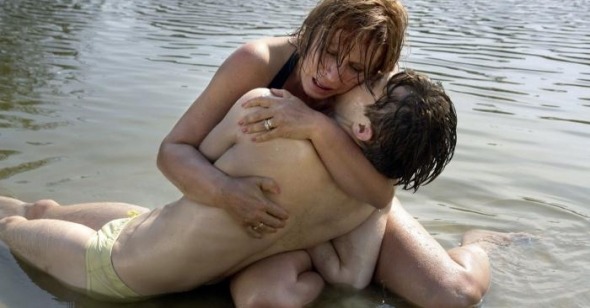Lost in Transition
by Jeff Reichert
Sweet Rush
Dir. Andrzej Wajda, Poland, no distributor
Is 2009 the year of Wajda? After the U.S. release of his long-gestating Katyn last February, Sweet Rush premieres a few short months later at the New York Film Festival. This kind of confluence is usually more the result of the vagaries of distribution than any sort of creative surge (though, seeing Claire Denis’s excellent White Material uptown at NYFF while her similarly excellent 35 Shots of Rum hangs in downtown at the Film Forum has to be regarded as some kind of positive augur for the state of world cinema), but even if Katyn was a Hindenburg of a piece, and Sweet Rush is something of a lesser excursion, two films in one year from the 82-year-old Pole is a gift worth embracing. It’s already been noted, but it’s worth repeating: along with Wajda, NYFF entries from Rivette, Resnais, and Oliveira make this year’s edition something akin to a geriatric director’s convention. That no film is an embarrassment, and most approach the heights achieved by these filmmakers’ youthful excursions, suggests that, for the right artists, the quality of artmaking is ageless.
Sweet Rush, the second film in the festival to open with hazily inviting shots of blowing grasses (the other being Resnais’s Wild Grass), kicks into gear with a dire monologue from lead Krystyna Janda detailing how the initial production plans for the film had to be put on hold for a year due to her husband’s (Edward Klosinski, Wajda’s cameraman for Man of Marble and Man of Iron) death from cancer. Janda, icily blonde, like a freeze-dried Gena Rowlands, stalks the spare room, lit only by the glow from its single window, as she delivers her self-scripted speech, recounting in frightful detail the events leading up to the cancer and how they collided with calls from her director about plans for the film and how Sweet Rush grew to be a very different kind of film. For his part, Wajda sits back and doesn’t disrupt focus or tone by moving the camera closer to his actress for easy emotional effect.
When the unbroken take finally cuts, Wajda takes us to another place entirely—a riverside dock, where Janda and Wajda discuss the titular marsh plant and scenes from the movie that we’re about to see. The documentary continues until an assistant strikes the clapper to start the first scene of the original Sweet Rush scenario, and the film switches modes seamlessly into a post-WWII period drama in which Janda (now an earthy, welcoming redhead) plays Marta, a country doctor’s lonely wife unknowingly dying of cancer who slips into a romance with a young town stud. Marta’s absent son, killed in the Warsaw uprising (a piece of information that raises the specter of Kanal), hangs over her narrative, lending her instantly familiar and physical interactions with the boy a queasy aspect. These jarring and intriguing hops from staged monologue to assumedly unstaged documentary realism to an obviously filmic space suggests that Sweet Rush will constantly shuttle back and forth between modes.
It might have been a more successful film if it had—Sweet Rush sticks too long with its overly familiar sun-dappled memory play before bringing us back to the monologue’s continuation, and reintroduces the documentary element even later. After Marta meets her young tryst for a rendezvous on the beach, his body conspicuously revealed, hers more discreetly covered, and the two roll around together in the sand for a spell, the boy nearly drowns while swimming across the river to procure for her the titular rushes. As she tries in vain to save him, Wajda cuts back to behind his cameraman (the always estimable Pawel Edelman) in time to see Janda break the take and head for the shore, much to the crew’s confusion. Soon after, she’s waiting by a modern highway, trafficked by modern cars, but still sporting her red wig and Fifties swimming suit. It’s a neat trick if you don’t stop for a second and wonder: “What the hell is the camera doing here?”
All three of the film’s modes pun off of each other in exactly the ways they’re supposed to—Marta’s fictional cancer rhymes with Klosinski’s real cancer and the documentary ties the events of the monologue to the events of the script. The idea is impeccable, and so is the production, but Sweet Rush remains mostly airless as enacted, a function of the fragmented conception that collides the three main strands over the film’s brief running time. I’m not sure the melodrama would have worked on its own terms, just as I’m not sure that further crosscutting would have fixed the uneven sense left by the oddly weighted bits. Even so, the film is still a confoundingly enjoyable muddle, mostly because of Janda, compelling both as her grieving self and a lusty country housewife. But even if Wajda’s construction can be faulted, one can’t help but assume this reconceived tripartite project is more watchable than the straightforward melodrama that was initially planned would have been. If Sweet Rush had been made by a young Polish (or Swedish or American) director, it’d probably be laughed out of theaters. Wajda makes it, and it’s still somehow adorable. There’s the curse of auteurism for you.
